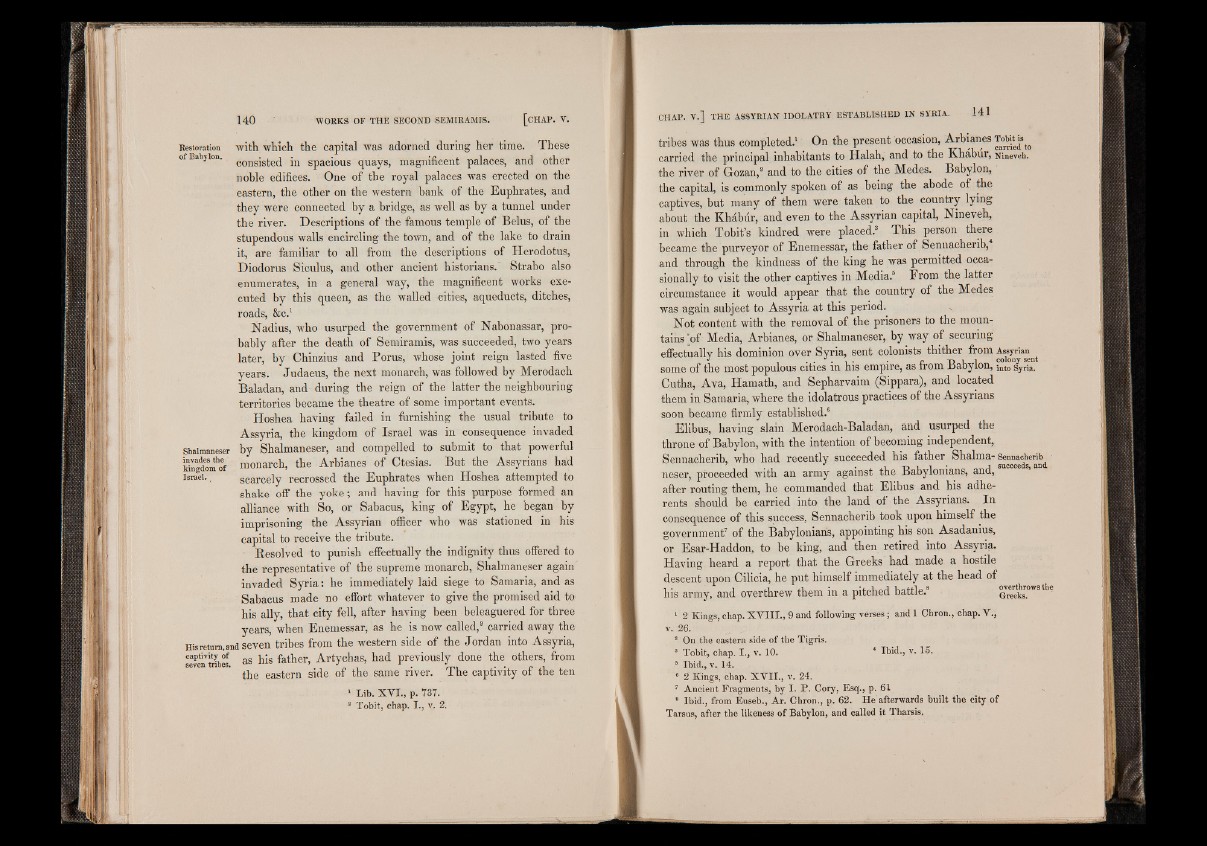
Restoration with which the capital was adorned during her time. These
of Babylon. c o n s j s (;eci j n spacious quays, magnificent palaces, and other
noble edifices. One of the royal palaces was erected on the
eastern, the other on the western bank of the Euphrates, and
they were connected by a bridge, as well as by a tunnel under
the river. Descriptions of the famous temple of Belus, of the
stupendous walls encircling the town, and of the lake to drain
it, are familiar to all from the descriptions of Herodotus,
Diodorus Siculus, and other ancient historians.' Strabo also
enumerates, in a general way, the magnificent works executed
by this queen, as the walled cities, aqueducts, ditches,
roads, &C.1
Nadius, who usurped the government of Nabonassar, probably
after the death of Semiramis, was succeeded, two years
later, by Chinzius and Porus, whose joint reign lasted five
years. Judaeus, the next monarch, was followed by Merodach
Baladan, and during the reign of the latter the neighbouring
territories became the theatre of some important events.
Hoshea having failed in furnishing the usual tribute to
Assyria, the kingdom of Israel was in consequence invaded
by Shalmaneser, and compelled to submit to that powerful
kingd'onfof monarch, the Arbianes of Ctesias. But the Assyrians had
Is ra e l., scarcely recrossed the Euphrates when Hoshea attempted to
shake off the yoke; and having for this purpose formed an
alliance with So, or Sabacus, king of Egypt, he began by
imprisoning the Assyrian officer who was stationed in his
capital to receive the tribute.
Resolved to punish effectually the indignity thus offered to
the representative of the supreme monarch, Shalmaneser again'
invaded Syria: he immediately laid siege to Samaria, and as
Sabacus made no effort whatever to give the promised aid to
his ally, that city fell, after having been beleaguered for three
years, when Enemessar, as he is now called,2 carried away the
H i s r e t u r n , a n d seven tribes from the western side of the Jordan into Assyria,
cap™ tnbes as his father, Artychas, had previously done the others, from
the eastern side of the same river. The captivity of the ten
1 Lib. X V I., p . 737.
5 Tobit, chap. I., v. 2.
tribes was thus completed.1 On the present occasion, Arbianes Tobc is^
carried the principal inhabitants to Halah, and to the Khabur, Nineveh,
the river of Gozan,2 and to the cities of the Medes. Babylon,
the capital, is commonly spoken of as being the abode of the
captives, but many of them were taken to the country lying
about the Khabur, and even to the Assyrian capital, Nineveh,
in which Tobit’s kindred were placed.3 This person there
became the purveyor of Enemessar, the father of Sennacherib,
and through the kindness of the king he was permitted occasionally
to visit the other captives in Media.5 From the latter
circumstance it would appear that the country of the Medes
was again subject to Assyria at this period.
Not content with the removal of the prisoners to the mountains
‘of Media, Arbianes, or Shalmaneser, by way of securing
effectually his dominion over Syria, sent colonists thither from Assyrian
. . . , . • . d v 1 colony sent some of the most populous cities in his empire, as Irom .Babylon, jnt0 Syria.
Cutha, Ava, Hamath, and Sepharvaim (Sippara), and located
them in Samaria, where the idolatrous practices of the Assyrians
soon became firmly established.6
Elibus, having slain Merodach-Baladan, and usurped the
throne of Babylon, with the intention of becoming independent,
Sennacherib, who had recently succeeded his father Shalma- Sennacherib^
neser, proceeded with an army against the Babylonians, and,
after routing them, he commanded that Elibus and his adherents
should be carried into the land of the Assyrians. In
consequence of this success, Sennacherib took upon himself the
government7 of the Babylonians, appointing his son Asadanius,
or Esar-Haddon, to be king, and then retired into Assyria.
Having heard a report that the Greeks had made a hostile
descent upon Cilicia, he put himself immediately at the head of
his army, and overthrew them in a pitched battle.8 Greek”WSth<?
1 2 Kings, chap. X V I I I ., 9 and following verses; and 1 Chron., chap. V.,
v. 26.
8 On the eastern side of the Tigris.
8 Tobit, chap. I ., v. 10. * Ibid., v. 15.
5 Ibid., v. 14.
6 2 Kings, chap. X V I I ., v. 24.
7 Ancient Fragments, by I . P . Cory, Esq., p. 61
8 Ibid., from Euseb., Ar. Chron., p. 62. He afterwards built the city of
Tarsus, after the likeness of Babylon, and called it Tharsis.